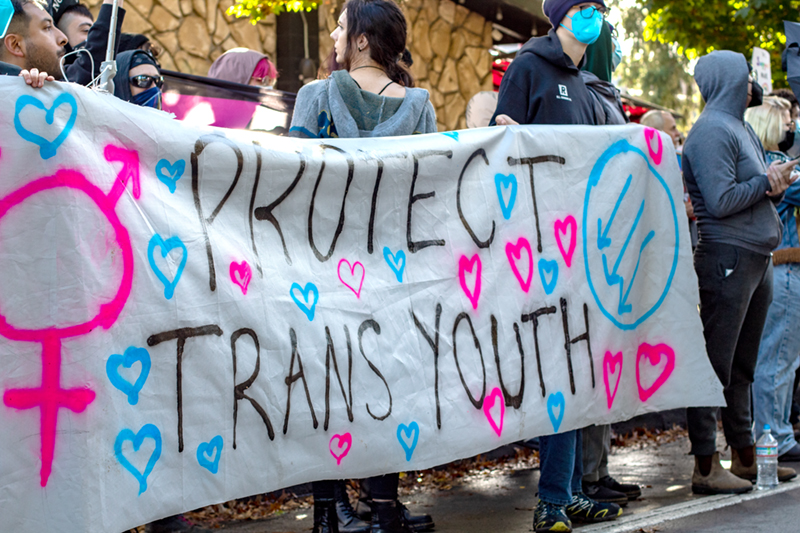Missouri father’s testimony against trans athlete ban gains national attention
Brandon Boulware told lawmakers how affirming his daughter's gender identity made her a happier, more well-adjusted child.

A Missouri father’s testimony in support of his transgender daughter earlier this month is gaining national attention after a bill to ban transgender athletes from competing based on their gender identity passed one House committee and appears poised to pass another.
Brandon Boulware, a lawyer and father of four, testified on March 3 before the Missouri House of Representatives, urging them to reject House Joint Resolution 53, which would prohibit transgender females from competing against cisgender girls in intramural and interscholastic sports, and permanently enshrine that prohibition into the state constitution.
It would also allow any athlete who feels they’ve been denied an athletic opportunity because of transgender inclusion to sue, and would strip schools and athletes that allow trans athletes to compete based on their gender identity — even as part of a larger team — of titles, awards or honors they’ve won.
If approved by both Houses of the legislature, the proposed constitutional amendment would then appear on the statewide ballot, where — given Missouri’s conservative and evangelical bent — it would likely pass, worrying transgender advocates about the types of political attack ads that would be aired to gin up support for the bill, the effect on trans kids of having their fellow Missourians deny their gender identity, and potential fallout that could result from a ballot initiative, including violence targeting transgender women.
The video of Boulware’s earlier testimony, shared by the American Civil Liberties Union on social media on Sunday, has received more than 309,000 likes on Instagram and 65,000 likes on Twitter, and has been retweeted more than 20,000 times, and has gained national attention, being shared by even some mainstream media outlets.
Many have compared it favorably to similar testimony offered by David Fuller, an Alabama cop and single father of three, including a transgender daughter, who testified against a bill to deny transgender people under the age of 19 access to various forms of transition-related medical care.
In his testimony, Boulware spoke about how he and his wife initially refused to acknowledge their daughter’s gender identity, leading her to be miserable after the family forced her to dress in boys’ clothing wear her hair short, and play with toys stereotypically associated with boys.
But when they began affirming their daughter’s gender, he said, she became more confident, happy, and more able to make friends. His daughter, who currently plays on a girls’ volleyball team, would be impacted by the ban on transgender athletes competing according to their gender identity.
MUST WATCH: Brandon Boulware, the father of a transgender daughter, testifies during a hearing asking Missouri lawmakers to stop discriminating against trans youth. pic.twitter.com/bTuSoyE1nW
— ACLU (@ACLU) March 15, 2021
Describing himself as a Christian, a business lawyer, a lifelong Missourian, the son of a Methodist minister, and father of four, Boulware recounted how his efforts to protect his daughter from scorn or social ostracism by denying her gender identity backfired, and pleaded with lawmakers not to pass the joint resolution.
“One thing I often hear when transgender issues are discussed is, ‘I don’t get it. I don’t understand.’ And I would expect some of you to have said that and feel the same way. I didn’t get it either. For years, I didn’t get it,” Boulware said.
He explained that he had denied his daughter’s gender identity out of fear that she or her siblings would be teased for her nonconformity with stereotypes associated with her assigned sex at birth.
“And truth be told, I did it to protect myself as well. I wanted to avoid those inevitable questions as to why my child did not look and act like a boy,” he said. “My child was miserable. I cannot overstate that. She was absolutely miserable. Especially at school. No confidence, no friends, no laughter. I can honestly say this — I had a child who did not smile. We did that for years. We did that against the advice of teachers, therapists, and other experts.”
Boulware said the day everything changed was when his daughter, clad in one of her sister’s dresses asked if she could play with some neighbor’s children. He said no, and she asked if she could do so if she changed into boys’ clothes.
“It was then that it hit me, that my daughter was equating being good with being someone else,” Boulware said. “I was teaching her to deny who she is. As a parent, the one thing we cannot do, the one thing, is silence our child’s spirit.
“I came here today as a parent to share my story,” he concluded. “I need you to understand that this language, if it becomes law, will have real effects on real people. It will affect my daughter. It will mean she cannot play on the girls’ volleyball team, or dance squad, or tennis team. … I ask you, please don’t take that away from my daughter, or the countless others like her who are out there. Let them have their childhoods. Let them be who they are.”
The joint resolution is currently awaiting action in the Rules Committee, having previously passed the House Families and Children Committee by an 8-6 vote, according to The Kansas City Star. Lawmakers are also considering a bill to prevent transgender minors from receiving gender-affirming care, even though transgender advocates note that most parents are usually involved in a child’s decision to transition and live according to their gender identity. That bill has not yet received a committee vote.
More than two dozen other states have introduced similar bills, either seeking to bar transgender athletes from competing in women’s sports or based on their gender identity, or seeking to prohibit minors from accessing treatments that would delay the onset of secondary sex characteristics and make it easier for a transgender person to transition.
Mississippi Gov. Tate Reeves recently signed a transgender sports ban into law, and South Dakota Gov. Kristi Noem appears poised to do the same, following the example set by Idaho last year. The Idaho law is currently being challenged in court and has been blocked from taking effect by a federal judge. In Alabama, lawmakers passed a bill prohibiting minors from accessing affirming care, which also requires school administrators to “out” suspected transgender or gender-nonconforming students to their parents.
Read more:
California man charged with hate crime for attacking a transgender woman with a skateboard
Montana man gets cited for harassing gay neighbor over anti-Trump flag
Amazon bans books that call LGBTQ identity a “mental illness”
Support Metro Weekly’s Journalism
These are challenging times for news organizations. And yet it’s crucial we stay active and provide vital resources and information to both our local readers and the world. So won’t you please take a moment and consider supporting Metro Weekly with a membership? For as little as $5 a month, you can help ensure Metro Weekly magazine and MetroWeekly.com remain free, viable resources as we provide the best, most diverse, culturally-resonant LGBTQ coverage in both the D.C. region and around the world. Memberships come with exclusive perks and discounts, your own personal digital delivery of each week’s magazine (and an archive), access to our Member's Lounge when it launches this fall, and exclusive members-only items like Metro Weekly Membership Mugs and Tote Bags! Check out all our membership levels here and please join us today!


























You must be logged in to post a comment.